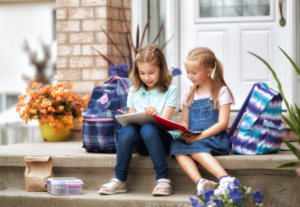Five Practical Steps to Help Kids Start A New School Year

Getting ready to start a new school year is downright frightening for many kids, especially these days. According to a survey of 600 teenagers on kidshealth.org, only 10% of students did not have a particular worry about returning to school in the fall in pre-pandemic days. About 30% of students named schoolwork their number one concern, another 30% were most worried about social issues, and appearances ranked third at 25%. And again, all of that was before the stressors of the 2020-2021 pandemic.
Article continues below...
Want to Stop School Struggles?
Download a free tipsheet "10 Parenting Tips for School Success" to stop constant challenges at school and at home!
Transitions are Stressful
Returning to the rhythm of the school year is tough at the best of times. Let's face it. Even returning to work from a weekend can be jarring. (See the songs “I Hate Mondays,” “Rainy Days and Mondays,” or “Monday, Monday” as examples). To make matters even more complicated, students have to adjust to a variety of “new situations” as well: new teachers, new curriculum demands, new classmates, perhaps even new and bigger buildings or a college campus, not to mention changing bodies and emotions.
All kids experience some degree of stress. Some simply say they're nervous, and others' behavior changes profoundly as the “first day of school” draws closer.
For kids with ADHD, learning disabilities, and related challenges, it's even harder. School for them has often been a place of failure – public failure – both academically and socially. These are the kids who are “smart but scattered,” the ones who teachers say “light's on but nobody's home,” the ones who other kids sometimes roll their eyes at. School can be a pretty tough place for these awesome kids, and helping them start the new school year well is critical.
It doesn't get a whole lot better when the school day ends. Now, they are faced with homework that they may not even understand, let alone find interesting enough to have the energy to tackle. And Mom or Dad somehow only seems to make it worse with those helpful hints and check-ins.
Parents Can Help Make Things Better
How can we be helpful and make it better? How can we develop independence and true confidence skills instead of simply taking over or just holding our breath and hoping for the best?
Here are five practical tips to help your child with ADHD step up to starting a new grade and school year.
- Go to the Bucket List
Transitions are tougher for kids with ADHD, especially transitioning to something they oppose. One way to ease the pain of summer coming to a close is to bring it up in the context of providing something they really want. Try something like, “Look, summer won't be here for too much longer, and you'll be focused on school and all that, but what's one thing on your summer list that you haven't done yet that we might be able to do?” By mentioning the uncomfortable subject of school in a way that specifically shifts attention away from it, you are both acknowledging that it's hard and opening the door to talk about it at another time. - Acknowledge Your Child's Feelings
Your child may already have a strong resistance to school. For kids with ADHD, many school activities do not activate the brain's reward centers. If your child brings up school with negative emotions (“I hate school! I don't want to go back!”), show some empathy and normalize their feelings. Instead of false reassurances such as “It will be fine” or “You always say that and it's not true,” reflect back their feelings. “Yeah, that part definitely sounds hard. Lots of kids your age probably feel the same way." - Accentuate the Positive
Once you've shown some empathy, then you can focus on more positive thoughts. Redirect them to something you're confident they do like about school. “Thank goodness for recess/gym/art/science/writing/that favorite teacher/your good friend“ and so on. - Keep the Bar Low.
A promise made is a promise you'd better keep for kids with ADHD. They're likely to take your words literally in ways that you never intend. “The beach might be nice” can easily become “You promised we were going to the beach!” Likewise, saying, “I'm sure school and your teacher will be nice” is your 100% satisfaction, money-back guarantee. Tone down assurances that all will be fabulous – and take a “wait and see” attitude. - Teach Flexible Thinking
Set the expectation that things will take time (which is something kids with ADHD are not wired to realize). Ask: “So far, what do you think will help you do well with this teacher?” This helps your child do three things:
-
- think from the teacher's point of view
- consider places where they have control
- be on the lookout for changing conditions
To set your child up for success as they start a new school year, try to keep things “matter-of-fact.” Don't try to prove what a good year it's going to be because of a good first day because the first bad day a week later will become proof of something else. A day is a day, and it's actually made up of many moments. Take things one day at a time, and begin to teach your child to do the same.
While the transition back can feel “high stakes” in those first days, remember that the entire school year is filled with opportunities for your kids to grow and gain confidence, moment by moment.


